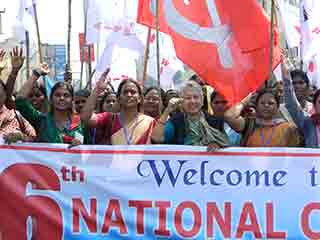 The 6th National Conference of All India Progressive Women’s Association (AIPWA) took place on 8-9 February at Vijaywada. The entire city was decorated with colourful posters and flags. The women, from around 20 states, marched in a spirited rally from the railway station to Thomalapalli Kalakshetram (renamed Panchadi Nirmala Hall, while Vijaywada was renamed Snehalata Nagar after the martyrs of the Srikakulam movement). Throughout the rally, women raised slogans in Tamil, Hindi, Kannada, Bengali, Assamese, Nepali, Hindi, Telugu and other languages, demanding women’s rights and equality. Lambada women dressed in their traditional costume, and comrades of the Andhra Pradesh Jan Sanskritika Mandali dressed in red with red flags aloft, had led the Rally, while women from many states spontaneously joined them in dancing.
The 6th National Conference of All India Progressive Women’s Association (AIPWA) took place on 8-9 February at Vijaywada. The entire city was decorated with colourful posters and flags. The women, from around 20 states, marched in a spirited rally from the railway station to Thomalapalli Kalakshetram (renamed Panchadi Nirmala Hall, while Vijaywada was renamed Snehalata Nagar after the martyrs of the Srikakulam movement). Throughout the rally, women raised slogans in Tamil, Hindi, Kannada, Bengali, Assamese, Nepali, Hindi, Telugu and other languages, demanding women’s rights and equality. Lambada women dressed in their traditional costume, and comrades of the Andhra Pradesh Jan Sanskritika Mandali dressed in red with red flags aloft, had led the Rally, while women from many states spontaneously joined them in dancing. Inaugural Session
On reaching the Thomalapalli Kalakshetram, veteran AIPWA leader Comrade Meera hoisted the AIPWA flag, and AIPWA’s National and State-level leaders paid floral tribute to the martyrs’ memorial, after which a minute’s silence for the martyrs was observed.
The inaugural session began with a revolutionary song performed by the Andhra Pradesh Jansanskritika Mandali. AIPWA leaders and guests were seated on the dais – including AIPWA President Srilata Swaminathan, General Secretary Meena Tiwari, Sanjila Ghising, General Secretary of the Democratic Revolutionary Women’s Front (DRWF) of Darjeeling, Durga Bhawani, State Vice President of NFIW, Challapalli Vijaya, State President of the Stree Vimukti Sangathan, AIPWA Vice Presidents Saroj Chaubey and Pratima Engheepi, National Secretaries Kavita Krishnan, Nagmani, Chaitali Sen, Shashi Yadav, Sunita, and AIPWA leaders from all states.
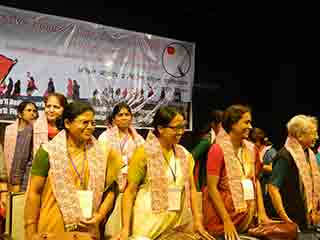
The Conference was inaugurated by AIPWA National President Srilata Swaminathan. In her inaugural address, Comrade Srilata said that governments and the powerful sections of society are only giving women discrimination, violence, and insults. But women are determined to resist all this, and will fight and win jobs, freedom, and dignity. She spoke of the many forms of discrimination and violence being faced by women in India, and of AIPWA’s struggles against the same.
Addressing the gathered women, Comrade Nagamani, State Secretary of AIPWA in Andhra Pradesh, spoke of women’s struggles against exploitative MFIs, against rapes and acid attacks in the state. She said women from all over the country had rejected and protested the shameful statement by Andhra Pradesh DGP Dinesh Reddy, that women ‘invited’ rape by ‘provocative’ clothes.
Comrade Durga Bhawani, State Vice President of NFIW, and Challapalli Vijaya, State President of the Stree Vimukti Sangathan addressed the inaugural session, expressing good wishes for the Conference, and calling for united struggles by women and women’s groups against the many challenges faced by the women’s movement.
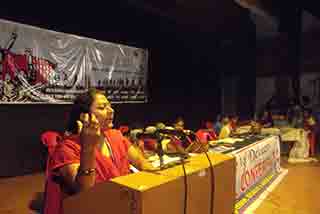
Comrade Sanjila Ghising of the DRWF spoke of the dual struggle of the women from Darjeeling: for their national identity, as well as for women’s rights. After her speech, comrades of the DRWF felicitated all the AIPWA leaders and guests by draping scarves representing the Gorkha cultural tradition.
Comrade Meena Tiwari, National General Secretary of AIPWA, gave the concluding address at the Inaugural session. She said that the women marching on Vijaywada’s streets, were raising slogans in different languages – but their spirit was the same: they were determined to resist oppression and win women’s rights. She said that the Prime Minister and President had recently said that India’s scores on sex ratio, maternal mortality, and other social indicators of women’s well-being are a ‘national shame.’ But, she said, these leaders had no right to call the situation of women a national shame, because their own policies are responsible above all for this shameful state of affairs.
Not only the market, but even the Government, she said, were treating women like cheap labour and objects of exploitation. Not only is their labour inside the home unpaid, even their work outside in Government schemes, remains shamefully underpaid. She said, “History is witness that whatever rights women have achieved have only been through women’s own struggles. We’ll carry forward that legacy, and fight and win jobs, freedom, and dignity for women.”
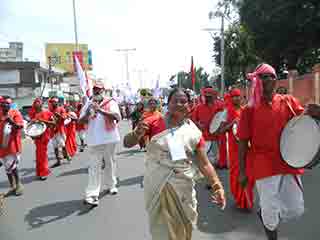
The Inaugural session was conducted by AIPWA National Secretary Kavita Krishnan.
Delegate Session
The delegate session of the 6th National Conference continued in the evening of 8 February as well as on 9th February. 425 women delegates from 17 states discussed their experiences of struggles, and to plan how to confront the challenges facing the women’s movement today. A presidium comprising Comrades Saroj Chaubey, Gauri De, Gunni Oran, Bhadrawati, Jasbir Kaur, Mona Lisa Tissopi, Thenmozhi, Gandhimati, T Aruna and Kavita Krishnan conducted the Conference.
Solidarity Messages from the South Asia Solidarity Group (London) and Working Women’s Alliance of Bangladesh (Bangladesh Sramajibi Nari Moitree) were read out at the Conference.
Women workers in ASHA, anganwadi, and mid-day meal schemes in Bihar, Jharkhand, Uttarakhand, Assam and other states shared their experiences of how they work in crucial health and education schemes of the central government, yet they are paid only a pittance of honorarium and no regular salary, with no job security. It was decided that AIPWA would intensify its efforts to organise these lakhs of women workers to secure their rightful place as government employees.
Women delegates discussed their experiences of struggles against many instances of atrocities against women by police officers and powerful people, including MLAs and MPs. They noted that in many cases of rape and harassment, we saw that the perpetrators get open protection of police stations and MLAs. It is difficult even to lodge an FIR, and even if one succeeds in lodging an FIR, the accused are not arrested.
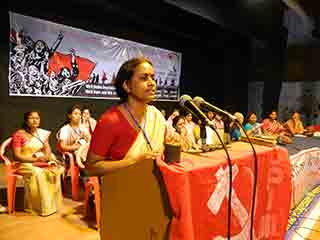
Women from Rajasthan, Madhya Pradesh, and Punjab discussed the phenomenon of ‘honour’ killings. In these states, ‘khap panchayats’ have harassed and even killed couples who marry by choice, breaking caste traditions. Women from other states said that in fact, this phenomenon is spreading across the country. If women marry by choice, they are either forced to marry someone else, or killed. The Conference stressed the need to resist such assaults on women’s right to decide about their own life.
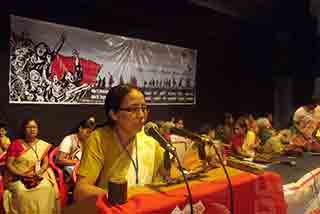
Women delegates discussed the struggles of women who are members of SHGs and exploited by Micro finance institutions. They demanded a ban on MFIs and easy government bank loans for women.
The Conference stressed the need to struggle for women’s right to dignified and secure jobs, which are crucial for women’s self-reliance. The Conference also condemned the Law Ministry’s proposal to dilute and weaken the dowry harassment law (Section 498 A).
The Conference elected a 95-member National Council, which in turn elected a 31-member National Executive. Comrades Srilata Swaminathan and Meena Tiwari were re-elected National President and Secretary, while Comrades Saroj Chaubey, Tahira Hasan, Kumudini Pati, Rati Rao, Medha Thatte, Mukta Manohar, Bharti S Kumar, Pratima Engheepi, Susheela Tigga, Anju Borkataky, Premlata Pandey and Sudha Choudhury were elected Vice Presidents, and Comrades Sunita, Anjali, Shashi Yadav, Chaitali Sen, R Nagamani, and Kavita Krishnan were elected National Secretaries.
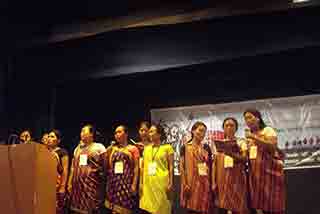
The Conference passed resolutions demanding cancellation of the Assembly membership of the BJP MLAs of Karnataka Assembly who were caught watching a gang-rape video inside the Assembly; demanding that the Andhra Pradesh DGP who blamed women for provoking rape, be made to quit; condemning the Norway government’s decision to separate two children of Indian origin from their parents on flimsy grounds; rejecting the Government’s food security bill as a farce, and demanding a genuine food security bill that would truly address the widespread malnutrition and hunger, especially among women and children; expressing protest against the gang rape and murderous assault on a dalit girl by goons of the ruling BJD in Odisha, and condemning the Odisha Women’s Commission report that denied the gang rape took place; expressing solidarity with the struggle for a separate Gorkhaland and Telangana; and condemning the violence on anti-nuclear protestors including a large number of women at Koodankulam, and demanded scrapping of the Koodankulam project.
Comrade T Aruna delivered a vote of thanks to all those who helped to make the Conference a success. CPI(ML)’s Andhra Pradesh Secretary, Comrade Murthy, expressed good wishes for the AIPWA Conference and confidence that AIPWA would grow stronger in the days to come.
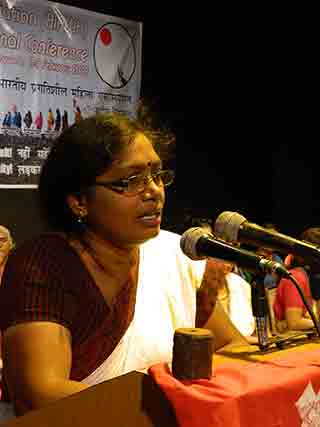
Delegates at the Conference responded to a call for funds for the forthcoming 9th Party Congress of the CPI(ML), and contributed to a collection in the Conference hall itself.
All the volunteers from Andhra Pradesh and other states were warmly felicitated and thanked for their immense efforts in making the Conference a success.
Cultural Evening
On the 8th of February, a cultural evening was organised, in which women from almost all the states participated with great enthusiasm, expressing the progressive and struggling cultural aspect of the women’s movement very well. The artists depicted their local struggles through folk dances and songs, as well as in individual compositions and poetry. The music and dance expressed struggles against the corporate plunder of land and resources, repression on people’s resistance, women’s resistance against inequality and violence, and their struggle for dignity and rights.
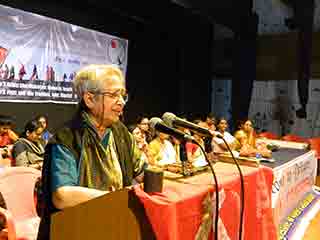
The cultural evening began with a graceful Bihu dance by Assam AIPWA comrades. Comrade Nagamani of Kakinada along with her team members, presented rousing songs that had the audience clapping to the beat, and also performed a musical play. Tamilnadu’s AIPWA comrades presented a song and dance, and Prerna, the women’s cultural team from Jharkhand, presented a traditional ‘jhoomar’ dance. Narender Kaur and Kiran of Punjab, Sunetra Sengupta of West Bengal, Kusum Verma of Varanasi recited poetry related to women’s lives and struggles. The team of Karbi Anglong women comrades presented progressive and revolutionary Karbi songs. Many women comrades sang individual songs –in Kudukh and Santhali languages, in Tamil, Assamese, Kannada and in many of the languages of Bihar. Comrade Meera Chaturvedi of West Bengal sang several songs in Bhojpuri, Bengali, Nepali, and, when requested by the audience, in Assamese too.
In response to ‘Why this Kolaveri,’ (‘kolaveri’ means ‘killer rage’ in Tamil), Comrade Srilata Swaminathan sang a spirited ‘We want Kolaveri,’ on the women’s movement and AIPWA’s struggles.
The cultural evening was conducted by AIPWA National Executive member Uma Gupta. The number of women participants in the cultural evening kept growing longer, and eventually, the programme had to be regretfully concluded, though the songs and dances continued even at the places where the delegates were staying! What was remarkable was that the participants ranged from 20-year-old Lakhimani from Jharkhand to 70-year-old Lakhrani Kunwar from Bihar.
An important part of the cultural aspect of the Conference was a painting exhibition on the theme, “Women’s oppression, Women’s Resistance,” by two young artists, Anupam Roy and Bablu Paul, and a poster exhibition by Kusum Verma from Varanasi. The exhibition of posters and paintings began on the first day, and continued till the end of the Conference. The paintings, prepared over a period of two months of painstaking and tireless efforts by the artists, were appreciated by several intellectuals as well as by the delegates from various states.
Solidarity Messages
South Asia Solidarity Group, London